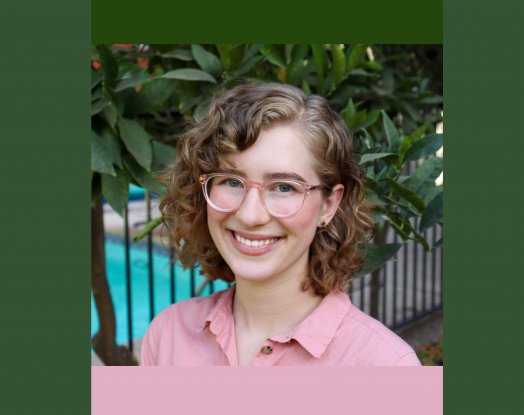Student Spotlight – Liv Slaby
Meet fourth-year undergraduate researcher Liv Slaby!
Liv majors in Musicology and is in our Undergraduate Research Scholarship Program.
How did you first get interested in your research project?
I’m pursuing a graduate degree in dramatic writing, so I knew I wanted my Musicology capstone project to be a creative piece. I constructed a plot that draws on several of my academic interests and takes place in an almost-underwater San Francisco in 2199. Two Earth-born college hockey players, hoping to move to Mars after graduation, find that their climb to the championships is complicated by the arrival of a new Martian teammate who reveals that the colony is no longer habitable. This project cites queer theory and literature as well as New Queer Cinema, which I use with sound and voice studies scholarship to explore queer, female, and non-binary embodiment in the context of sports and audio drama. I also employ science fiction techniques to explore the interpersonal and environmental concerns of my characters.
What has been the most exciting aspect of your research so far?
I’ve enjoyed reading, watching, and listening to the diverse scholarly and creative texts that comprise my bibliography. I’ve been influenced by the works of Deleuze and Guattari, Todd Haynes, Jack Halberstam, Timothy Morton, Samuel R. Delany, and Nina Eidsheim. Exploring the possibilities of sound as a dramatic medium is something I didn’t foresee myself doing as a writer, but it’s been fascinating getting to know my characters in the context of how their voices and sonic environments will embody them in listeners’ imaginations.
What has surprised you about your research or the research process?
When I applied for URSP, I thought I’d spend the year writing the script for a staged theatrical piece. However, due to the impact of social distancing on theatrical practice, I decided it would be more pragmatic to explore ideas of isolation, disorientation, and uncertain futures through an auditory medium. Now, I’ll finish the (shorter) script this winter and spend much of the year recording and producing the piece so I can present a fully realized audio drama at Undergraduate Research Week in May.
What is one piece of advice you have for other UCLA students thinking about doing research?
I recommend working with a mentor or project advisors with whom you connect and feel comfortable sharing your first drafts and half-formed ideas. Writing isn’t easy with only your own head as a sounding board, and it’s helpful to have a mentor who keeps your timeline on track and is available for you to discuss and develop your ideas through conversation.
What effect do you hope your research has in your field, at UCLA, in your community, or in the world?
I hope that I will encourage listeners to be aware of the assumptions they make about the “locations” of the voices, including demographic information like race, gender, and age. In our predominantly visual society, I aim to draw attention to sound’s multisensory forms and potential for interpersonal connection. By dealing with embodiment in a disembodied medium, I hope to illuminate the ways we orient ourselves to our own bodies and to entities we perceive as others, and to explore compassion through sonic perception.




